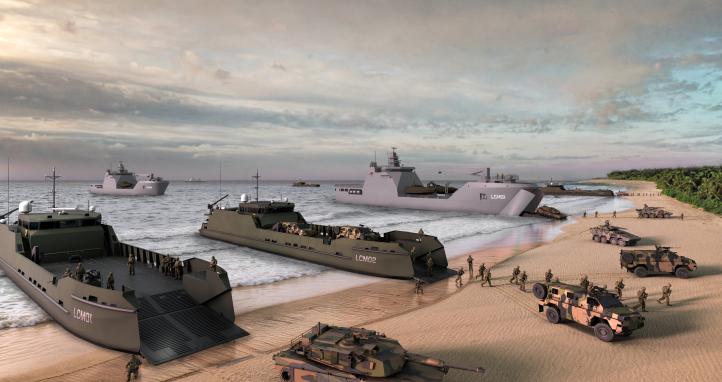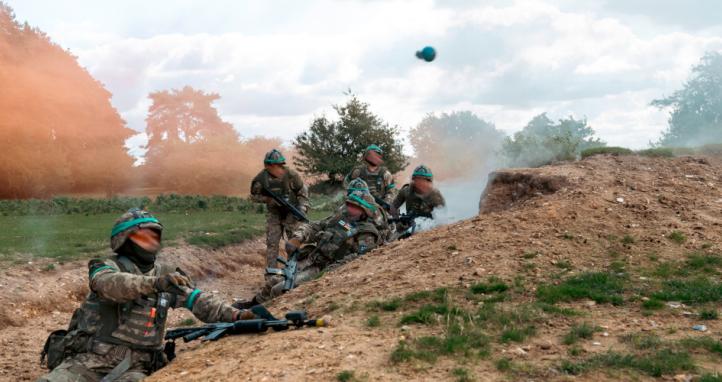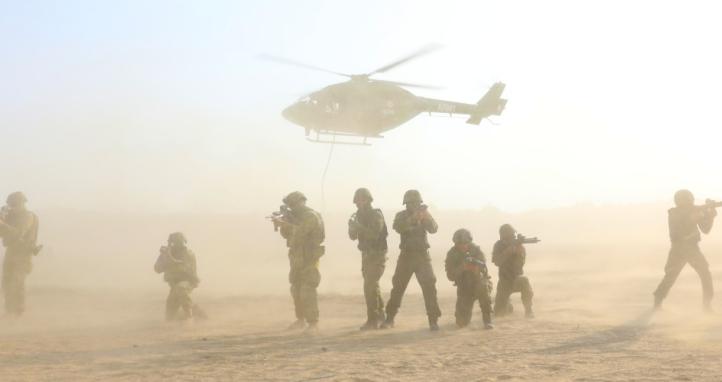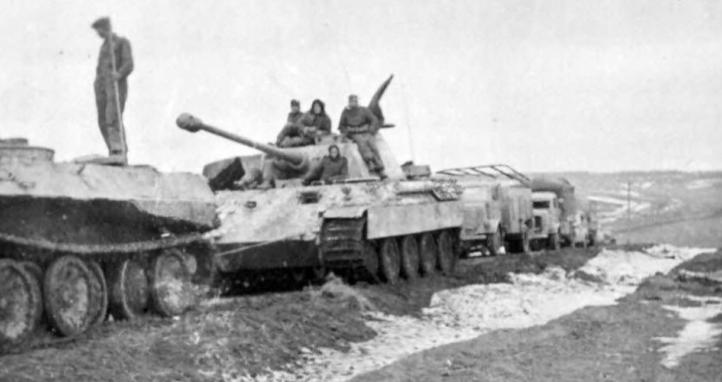Facts and figures
| Government type | Parliamentary Republic |
| Notable people |
|
The 'Know Your Region' series is designed to support unit and individual professional military education on the South East Asian region. It's important for all serving members of our military to have a foundational knowledge of the countries and issues in the Indo-Pacific.
FIJI – DIPLOMACY
On this page:
- Summary
- Politics
- Treaties, Policies, International Forums
- Fiji and Australia
- Fiji and China
- Fiji and USA
- Fiji and Russia
Summary
Fiji was ruled by the British Empire from 1874 to 1970. In 1970, the country began its road to independence, separating from British rule, but remained an independent sovereign state with Queen Elizabeth II as Head of State. This existed until a coup in 1987 resulted in Fiji gaining full independence from the Commonwealth. Fiji is now a republic with a president as Head of State and a Prime Minister.
Prior to a second military coup in 2006, Fiji’s foreign policy was closely aligned with Australia and New Zealand, and Fiji had benefited from an ongoing collaborative relationship. However, international sanctions followed the 2006 coup and changed the direction of Fiji’s foreign policy. A ‘look North’ policy saw Fiji looking for alternative diplomatic partners, in particular, China. After sanctions were lifted and key partners reengaged with Fiji in 2014, Fiji’s relationship with Australia and New Zealand returned towards pre 2006 levels and has since strengthened.
Today, Fiji’s foreign policies focus on maintaining peaceful and democratic cooperation between regional neighbours and global partners. Fiji’s position in the region is influential. It is a leader of the Pacific Islands Forum, and its stance on climate change has positioned it as a regional leader on a critical policy matter. Since the early 2000s, Fiji has expanded its diplomatic relations to over 170 countries from the initial ‘Look North’ foreign policy, and is now a regional player within a new, emerging Pacific diplomacy. The following video gives a good summary of Fiji’s recent history:
Politics
From 1970, Fiji adopted a constitutional democratic form of government, based on the British Westminster system and the Alliance Party (AP) governed the country from 1970 until the Fijian Labour Party defeated the AP in the 1987 elections. The new government was a coalition led by a Fijian Prime Minister, Dr Timoci Bavadra, whose party was heavily Indo-Fijian. This resulted in political unrest, and ultimately a coupe d’état (or coup) which overthrew Bavadra in May 1987. A second coup followed in September that year. More details can be found on the #KYR Fiji Military Page. Chronological details of the country’s political events from independence to 1999 can be found on the UNHCR website.
The country experienced another military coup in 2006, led by Voreqe ‘Frank’ Bainimarama, a military leader, who was subsequently appointed interim Prime Minister in 2007. His political party, Fiji First, won the 2014 elections, and he was re-elected in 2018. In 2022, Bainimarama was defeated by Sitiveni Rabuka's People's Alliance party at a general election. Prime Minister Rabuka - the instigator of the 1987 military coup - remains as PM as of 2024.
The 2006 coup was deemed unconstitutional and strongly condemned by Australia, members of the Pacific Island Forum, Commonwealth nations and The UN Security Council. Sanctions were imposed by all, and Fiji’s membership to the Commonwealth and the Pacific Islands Forum were revoked. It took until 2014 for stability to return following a general election. The Australian Government lifted all remaining restrictions and resumed its Defence Cooperation Program with Fiji that year.
To learn more about Fiji’s politics, see the resources below:
- Videos
- Podcast
- Articles
- First Fiji, Then the World
- Parliament of the Republic of Fiji
- Ministry of Foreign Affairs Fiji
- ANU: A time Bomb Lies Ahead: Fiji’s Road to Independence 1960-1970 (paper)
- BBC: Fiji Profile - Timeline
- Fiji – Political Parties
- A timeline of the 2009 political crisis in Fiji and key regional reactions
- Fiji’s 1987 coup: from trauma to cohesion
- Frank Bainimarama’s Journey from Coup Leader to climate Change Crusader
- ANU: The New Pacific Diplomacy
Treaties, Policies, International Forums
Fiji maintains diplomatic relations with over 170 countries and has a High Commission in Australia. Fiji is a member of many regional and international groups including Pacific Islands Forum, the Forum Fisheries Agency, The Commonwealth of Nations, the Melanesian Spearhead Group, the World Health Organisation and the United Nations. Through these memberships, Fiji demonstrates commitment to its own economic, political and cultural security, as well as security and peace in the Pacific region, and building enduring cooperation with its neighbours and the international community.
Fiji is a founding member of the Pacific Islands Forum (PIF). Established in 1971, the PIF includes 16 countries in the Polynesia, Melanesia and Micronesia regions, as well as Australia and New Zealand. The forum develops policies to support economic and social well-being of Pacific countries, and it enhances cooperation between governments and other international agencies in the region. While Fiji was influential in establishing the forum, in 2009 its membership was suspended as a result of the military coup and the delayed general elections, which were in contrast with Fiji’s democratic constitution. The suspension was lifted in 2014.
Fiji is one of 13 South Pacific Islands and countries that formed the Rarotonga Treaty: the south Pacific Nuclear Free Zone which, since 1985, is committed to neither developing nor testing nuclear weapons. Fiji is also a member of The Pacific Community, addressing issues such as climate change, food security, human rights and youth employment. Fiji has been recognised by the UN for its enduring work towards climate change to protect the future of island nations.
Earlier this year, Fiji’s Permanent Representative to the UN in Geneva, Ambassador Nazhat Shameem Khan was elected as President of the United Nations Human Rights Council, although some opposed this move, citing human rights concerns within Fiji.
Fiji is part of the Melanesian Spearhead Group which supports the international laws set by UN sub-groups to support economic growth in the region and protect human rights.
For more information on the treaties, policies and international forums detailed in this section, see the resources below:
- Videos
- Articles
Fiji and Australia
Fiji and Australia have shared strong diplomatic relations for most of the 50 years since Fijian independence in October 1970. The relationship became strained following the 2006 coup; however, once the Fijian government stabilised, and democracy returned in 2014, the Australia/Fiji relationship continued to improve and is now built upon mutual co-operation and assistance focussing on their future bi-lateral roles. Of late, the two nations have agreed to the ‘Fiji-Australia Vuvale Partnership’ to further develop cooperation through a number of principles. These work towards maintaining mutual trust, respect and understanding; working cooperatively towards economic and security goals for the benefit of the region; and strengthening ‘people-to-people’ links.
Fiji and Australia have supported each other through times of natural disaster and humanitarian crises. Operation FIJI ASSIST in 2016 was Australia’s support to Fiji following Cyclone Winston, and again in response to Cyclone Yasa earlier this year. Fiji supported Australia through Operation BUSHFIRE ASSIST 2019-2020. In 2021, Australia provided COVID-19 assistance to Fiji in the way of 250,000 vaccines. The following video gives an overview of Fiji’s assistance with Operation BUSHFIRE ASSIST:
Fiji is a leading advocate in addressing the impacts of climate change. Members of the Pacific Island Forum have agreed that climate change is a regional priority and are committed to reducing their carbon emissions under the Paris Agreement of 2015. Fiji and Australia have, at times, disagreed on the amount of action required to reduce the impact of climate change, including Australia’s position on coal and LNG production.
For more information on Fiji and Australia, see the resources below:
- Videos
- Articles
- DFAT: Fiji Country Brief
- Australia-Fiji Relation: Past, Present and Future
- Stepping-up in Fiji
- Australian Support to Fiji for COVID-19 vaccinations
- Pacific Leaders Condemn Australia's 'weak' climate target in Open Letter to Scott Morrison
- Pacific Island Forum: Climate Change and Resilience
- Fiji Calls on Australia to 'walk the talk' by Adopting More Ambitious Emissions Targets
- Australia’s Influence in Pacific Islands Grows as China’s Wanes
Fiji and China
Fiji and China have shared a diplomatic relationship since the mid-1970s and Fiji was the first of the Pacific Island nations to establish diplomatic ties with the superpower. This relationship grew as a result of Fiji’s ‘look North’ policy. China did not impose sanctions on Fiji following the coup of 2006. China’s foreign policy has provided financial support to Fiji’s economic growth, including trade and investment opportunities. China has also offered support to Fiji in its management of the COVID-19 pandemic, as well as providing $100,000 to Fiji for recovery efforts following Cyclones Ana and Yasa. China’s influence in the Pacific Islands region has drawn criticism from some, with some nations accusing China of ‘debt trap’ diplomacy as it pursues its One Belt One Road initiative throughout the Pacific region.
For more information on the relationship between Fiji and China, see the resources below:
- Videos
- Podcasts
- Articles
Fiji and the USA
Fiji and the USA established diplomatic relations in 1971. They have mutual economic and foreign policy values and have worked together on international peacekeeping missions. The US Peace Corps has had volunteers deployed to Fiji since 1968. The USA provides economic aid through a number of different organisations to nations within the Pacific, including Fiji. The USA also provides Fiji with funding to support the Republic of Fiji Military Forces; and the two nations have partnerships supporting a range of fishing needs.
In 2020, the USA and Fiji signed the Defense International Military Education and Training Agreement and the Defence Cooperation Agreement. These two agreements strengthen the bilateral relationship and provide continued support to the defence and stability of Fiji and the Pacific islands region.
Under the Biden administration, the USA has publicly acknowledged the importance of climate change and sought to return to the Paris Agreement from which the Trump administration had withdrawn. Although Fiji quickly welcomed the new administration’s pledge to fight climate change, the country was not invited to President Biden’s climate summit in April of 2021. Listen to this podcast on Prime Minister Bainimarama disappointment at his exclusion from the summit, particularly given Fiji’s lead on climate change in the region.
Fiji Conveys Disappointment at not Getting an Invite to US President's Climate Summit
For more information on the relationship between Fiji and the USA, see the resources below:
- Videos
- Articles
- US Relationship with Fiji
- US Dept of State: Fiji
- History of USA and Fiji
- USA-Fiji / Pacific Island Countries Relationship – Current Issues
- The USA and Fiji Reaffirm Security Assistance Cooperation
- Fiji – USA First Meeting under Trade and Investment Framework Agreement
- The United States & Fiji Should Bolster Security Cooperation
- US And Fiji Seal Agreement on Defence and Security
- US-Fiji signing of Defense Cooperation Agreement
- Biden Pledges ‘no strings’ Pacific Pandemic Support
- Biden Speaks to Pacific Islands Forum to Counter China
- Building Bridges, Burning Bridges: Biden’s Climate Change Summit
- President Joe Biden Promises Pacific Islands Forum US will 'dramatically' Cut Emissions
Fiji and Russia
Fiji established a diplomatic relationship with Russia in 1974. Russia was another country which did not impose sanctions on Fiji following the 2006 coup, and Fiji increased engagement with Russia as part of its ‘Look North’ policy. In 2013, Prime Minister Bainimarama became the first Fijian Prime Minister to visit Russia. Several MoUs between the two nations, which include healthcare and education, were signed in 2013. Another MoU was later agreed upon for the provision of military resources and in 2016, Russia donated a large consignment of weapons and equipment to Fiji. While the weapons were described as peacekeeping resources, concern was raised by Western nations regarding the legitimacy and impact of their use, not only in Fiji but in other Pacific Island nations. This concern was further exacerbated when Russian soldiers arrived in Fiji shortly afterwards to train members in their use.
For further information on the relationship between Fiji and Russia in the last decade, see the articles below:
- Articles
- Fiji Government: Fiji Signs Landmark Agreements with Russia
- Fiji Government: Fiji and Russia Strengthen Relations
- Fiji Gets Closer to its New Friends: Russian Arms Received by Increasingly Authoritarian Regime
- Russia ships arms to Fiji: What will be the quid pro quo?
- The Bear Returns to the South Pacific: Russia Sends Arms to Fiji
- MOFA Fiji: Russia and Fiji Celebrate 45 years of Diplomatic Relations
- Kremlindo-Pacific: Is Russia Extending its Reach?
Discussion Questions:
- With Fiji’s leadership of the Pacific Island’s stance on climate change, what does this mean for Australia and New Zealand as the impacts of climate change in the region, and the Pacific Island’s resilience to cope with the scale and scope of the change? What does this mean for US, China and Australia? How will this impact on the future operations of the ADF?
- China has demonstrated an interest in Fiji, notably through economic support in not imposing sanctions after the 2006 coup, and also through support with the COVID-19 pandemic. What concerns might Australia have over Chinese involvement with Fiji? What concerns might China have over Australia’s involvement with Fiji?
Last Reviewed 09/2024
Know your region
Know Your Region series gives you a shortcut to understanding other nations in the Indo-Pacific region.









